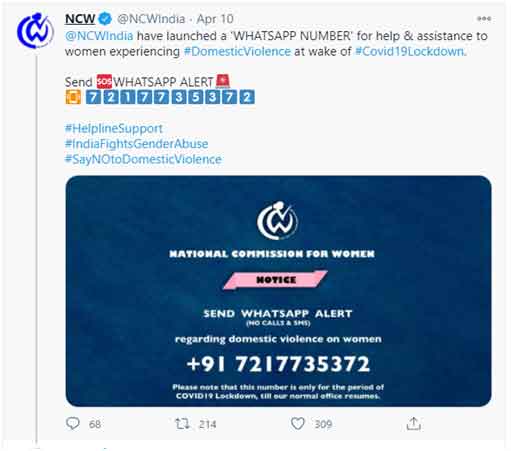
One in three women worldwide experience physical or sexual violence. Most of this violence is perpetrated by either their intimate partner or a relative. Due to the Coronavirus pandemic outbreak and the subsequent lockdown, the violence against women, especially domestic violence, has increased significantly. This is known as the Shadow Pandemic.
With the reports of the second wave of the COVID-19 pandemic intensifying in recent days, there is a real threat of the intensification of the shadow pandemic.
Inlined with the global trend, India has also seen a spike in the number of reported domestic violence cases during the first period of lockdown enforcement due to COVID-19. According to a report by Saravana Ravichandran & Manisha Shah of the University of California, Los Angeles, India has seen a higher magnitude in domestic violence cases in districts that saw the strictest lockdown measures. It also states that in districts where a larger proportion of husbands saw domestic violence as justified, larger increases in domestic violence complaints have been observed. According to the National Commission for Women, complaints across various kinds of violence against women have seen a sharp rise during the lockdown, especially domestic violence and cybercrime.

Due to Covid-19 Pandemic, many people, especially working in the unorganized sector, have lost their jobs. The lockdown, combined with the unemployment, has increased the anxiety level of people. There were news reports of husbands beating up their wives for issues as trivial as not putting garlic in daal.
The violence is not limited to beating. There have been cases of homicides as well amidst the lockdown.
In Azamgarh district of Uttar Pradesh, Irshad (49) killed his wife Amina (45) after a heated argument. A 45-year-old man in Telangana’s Meerpet allegedly strangled his 40-year-old wife to death for failing to give him food on time.
In India, domestic violence against women is seldomly discussed and rarely reported. On a normal day, men used to stay outside home for the most part of their day. But, due to the lockdown, women are bound to spend more time at home with their abusers and are also unable to seek any support. Also, the possibility of getting a job in this scenario is difficult, which furthers restrains unemployed women from taking any drastic step against their family or partner.
The United Nations has started working to tackle the shadow pandemic worldwide by taking out $25m from its emergency fund. 30% of this fund is proposed to be given to women-led local organizations that prevent violence and help survivors access medical and legal help, family planning, mental health services, and counselling.
Sheba George from Ahmedabad leads one such organization, SAHR WARU- A Women’s Action and Resource Unit. Sheba George says while SAHR WARU is working towards reducing inequalities between genders and empower women, an NGO or a set of NGOs cannot bring the entire change. She points out the need for Government and the Corporates to take necessary steps towards this. During this shadow pandemic, it would be very important for the Government to take note and enact proper steps towards the cause. There could be an argument that says that Governments are currently occupied in fighting the COVID wave and the health emergencies, but historically, even in the pre-pandemic era, the efforts in this area have been minimal. The Nirbhaya fund, launched in the wake of the 2012 gangrape, has only seen 36% usage since 2013.
The diminishing efforts Corporates in reducing inequality are also alarming. The CSR expenditure in reducing inequality has decreased almost three times (187 Cr. vs. 525 Cr.) in 2018-19 when compared to 2017-18. Only 10% of this spend comes from Public Service Undertaking (PSU)s, showing a picture of no focus towards reducing inequality, which in turn results in empowering women.
Victims of domestic violence need to understand that any kind of violence is totally unacceptable, and the perpetrator deserves to be punished by law. Often abusing, slapping and beating are deemed non-serious, and women usually bear these in silence. But ignoring such instances fuels the aggressive behaviour of the perpetrator and later leads to even more violence.

There are a number of helplines for domestic violence and free online counselling websites that victims can use for relief.
In the short term, the Government should use national television to raise awareness about the possible ways victims could seek help. There is also a need of more ways of reporting an abuse without detection. In Spain One smart innovation in Spain’s Canary Islands, since copied in a number of countries, is for victims to use the code “Mask-19” at local pharmacies to discreetly signal their plight, according to Financial Times. Government should also provide financial assistance, so that more women could escape their abuser.
One of the major factors in bringing change in the long term would be to stimulate young minds in understanding gender equality as a part of their curriculum. Gender equality in mainstream education would help change children’s patriarchal mindsets and help them understand the rights of women. Education in this regard through National television might also contribute to gender equality.
Sushmita Das, currently pursuing my MBA from IIM Ahmedabad
SIGN UP FOR COUNTERCURRENTS DAILY NEWSLETTER














































